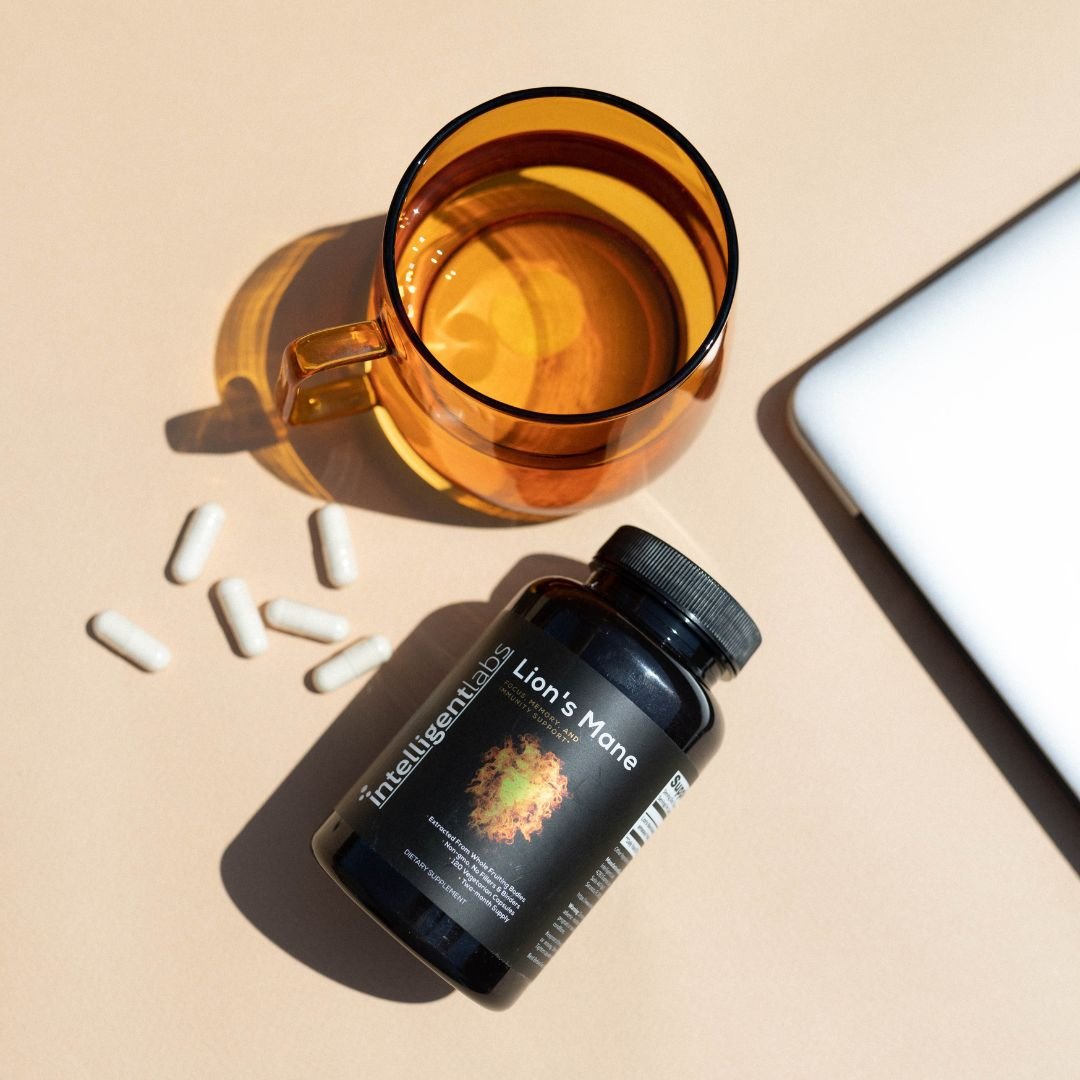Lion’s mane, a non-stimulating medicinal mushroom and nootropic, is usually taken in the morning for its energy and brainpower benefits. However, it also helps with sleep quality. These 2 seemingly contradicting benefits – energy vs. sleep – lead people to ask the million-dollar question – is it a good idea to take Lion’s Mane Mushroom before bed? Scroll down to find out!
Table of Contents
What is lion’s mane?
We’ve talked about lion’s mane in-depth in our ultimate guide to lion’s mane mushrooms. But just in case you haven’t read that post – or you’re in a hurry – here’s a summary:
Lion’s mane, scientifically known as Hericium erinaceus, is a mushroom resembling a lion’s mane, pom pom, or bearded hedgehog. Found on dead logs or dying trees in the Northern Hemisphere, it’s a popular mushroom supplement for brain health, enhancing cognitive function, concentration, mental alertness, and energy levels.
These benefits all suggest that lion’s mane should be taken in the morning, right? I mean, if you’re trying to get some quality shut-eye at night, then the last thing you need is to take something that will keep you alert and awake…
But here’s the thing – lion’s mane mushrooms can also help you get better sleep quality, which then brings us to the next question…
Should you take lion’s mane before bed?
There’s no clear-cut answer to this question since mushrooms do affect people differently. So, the definitive answer will depend on you and how you react to it. Think of how coffee affects different people – some can go straight to bed even right after drinking coffee while others drink it to power up their day!
Here’s what we suggest: try taking lion’s mane before bed for a few days and observe how it affects you.
If it makes you sleepy and you can sleep soundly, then taking lion’s mane before bed is perfect for you!
But if it keeps you awake for hours, then best avoid taking it before bed!
So, what do the studies say, you ask?
Well, there is a study that supports the claim that lion’s mane has a calming effect and can help improve sleep quality.1 And taking a capsule right before bedtime may be a good idea, especially for those suffering from anxiety and depression.2
For those looking to experience the nootropic benefits of lion’s mane, find out when’s the best time of day to take this shroom!
Related article: Sip Your Way To Better Health With Lion’s Mane Mushroom Coffee

When is the best time to take lion’s mane mushrooms?
You will find most supplement manufacturers will recommend taking lion’s mane (or any nootropic, for that matter) in the morning. This is because MOST people work during the day, so morning is the best time for those needing a mental and energy boost to help them be productive throughout the day.
On the other hand, people working the night shift, a.k.a. graveyard shift, may find it more favorable to take lion’s mane before their workday starts. So, this would mean taking lion’s mane between late afternoon and early evening.
Who should take lion’s mane in the morning?
Here’s an example of people who can benefit from taking lion’s mane during the day:
- Students who are studying for an exam or preparing for an important presentation
- Professionals who need to concentrate on important tasks at work to solve problems and close big sales!
- Athletes who need brainpower and motivation to hit their goals
- Older individuals who want to enjoy optimal clarity and awareness as they go about their day
Who should take lion’s mane at night?
And here’s an example of people who can benefit from taking lion’s mane at night:
- Night owls who perform best at night, e.g. writers, designers, developers, and other content creators
- Hospital workers, security officers, and other professionals on the night shift who need to be awake to do their jobs
- Firefighters, law enforcement, and other emergency responders who need to stay focused to keep people out of harm’s way!
Who can take lion’s mane more than once a day? And why?
A group of people may benefit from taking lion’s mane day AND night.

According to this study, a group of 50 to 80-year-olds with mild cognitive impairment who took lion’s mane powder 3x a day for 16 weeks experienced significant cognitive improvement over those taking placebo. 3
Amazing results, right? Indeed! But take note that lion’s mane needs to be taken continuously for the effects to continue. This means that if you stop taking lion’s mane, then you can also expect its cognitive-enhancing effects to eventually stop as well.
That said, if you know someone who’s starting to experience cognitive decline, try suggesting lion’s mane. It’s the only edible/medicinal mushroom that can stimulate NGF or nerve growth factor! 4
This is why lion’s mane works so well as a cognitive enhancer. Its bioactive compounds not only boost cognition but also repairs damaged neurons, a.k.a. brain and nervous system cells. It can even help repair damaged myelin. This makes lion’s mane a very promising natural cure for various neurodegenerative diseases like Alzheimer’s, dementia, and even multiple sclerosis.5 6 7
Final thoughts
Taking lion’s mane before bed may be a good idea for some people, but not so much for others. As mentioned earlier, try taking it yourself before bedtime and see how it affects you.
So, what’s the best lion’s mane supplement that you can take either first thing in the morning or before bed?
Check out our Intelligent Labs Lion’s Mane supplement powder! It’s extracted from the fruiting bodies of H. erinaceus, not the mycelia. The fruiting body contains beta glucans, a polysaccharide that helps with immunity, as well as hericenones, the bioactive compound behind lion mane’s NGF benefits. Take 1-2 capsules daily and see the difference in just a few days!
Related article: Prefer to eat lion’s mane? Check out these lion’s mane mushroom recipes!
💬 Something on your mind? Share your thoughts in the comments. We love hearing from curious minds.
📩 And while you’re here, join our newsletter for more smart stuff (and secret perks)!
References:
- Vigna, Luisella, et al. “Hericium Erinaceus Improves Mood and Sleep Disorders in Patients Affected by Overweight or Obesity: Could Circulating Pro-BDNF and BDNF Be Potential Biomarkers?” Evidence-Based Complementary and Alternative Medicine, vol. 2019, 18 Apr. 2019, pp. 1–12, https://doi.org/10.1155/2019/7861297. ↩︎
- Chong, Pit Shan, et al. “Therapeutic Potential of Hericium Erinaceus for Depressive Disorder.” International Journal of Molecular Sciences, vol. 21, no. 1, 25 Dec. 2019, p. 163, https://doi.org/10.3390/ijms21010163. ↩︎
- Mori, Koichiro, et al. “Improving Effects of the Mushroom Yamabushitake (Hericium Erinaceus) on Mild Cognitive Impairment: A Double-Blind Placebo-Controlled Clinical Trial.” Phytotherapy Research, vol. 23, no. 3, Mar. 2009, pp. 367–372, https://doi.org/10.1002/ptr.2634. ↩︎
- Mori, Koichiro, et al. “Nerve Growth Factor-Inducing Activity of Hericium Erinaceus in 1321N1 Human Astrocytoma Cells.” Biological & Pharmaceutical Bulletin, vol. 31, no. 9, 2008, pp. 1727–1732, https://doi.org/10.1248/bpb.31.1727. ↩︎
- Jefferson, Robin Seaton. “Researchers Now Say Mushrooms May Reduce Risk of Cognitive Decline.” Forbes, www.forbes.com/sites/robinseatonjefferson/2019/03/21/maybe-theyre-all-magic-researchers-now-say-mushrooms-may-reduce-risk-of-cognitive-decline/?sh=64ad5ca62160. ↩︎
- Zhang, Junrong, et al. “The Neuroprotective Properties of Hericium Erinaceus in Glutamate-Damaged Differentiated PC12 Cells and an Alzheimer’s Disease Mouse Model.” International Journal of Molecular Sciences, vol. 17, no. 11, 1 Nov. 2016, p. 1810, https://doi.org/10.3390/ijms17111810. ↩︎
- Kolotushkina, E. V., et al. “The Influence of Hericium Erinaceus Extract on Myelination Process in Vitro.” Fiziolohichnyi Zhurnal (Kiev, Ukraine: 1994), vol. 49, no. 1, 2003, pp. 38–45, pubmed.ncbi.nlm.nih.gov/12675022/. ↩︎




